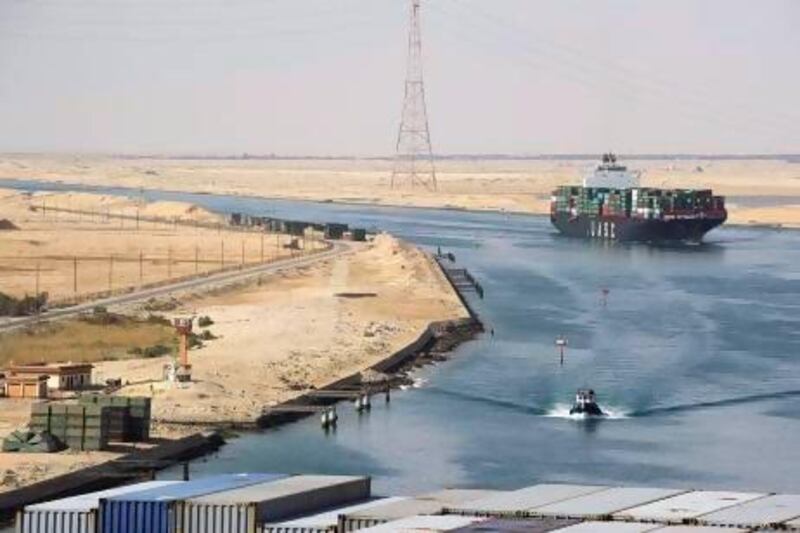Shipping insurers are confident that Egypt's Suez Canal will remain unaffected by this week's violent clashes between the army and supporters of the Muslim Brotherhood despite the country's increasingly higher risk profile, said a senior official with London's marine insurance market.
"Egypt is not, the Suez is not on the watchlist," said Neil Roberts, a senior technical executive with the Lloyd's Market Association (LMA) in London. "We don't consider it necessary that shippers tell us they are going there. We are very conscious of Egyptian authorities to take the Suez as a high priority asset - to keep it running and open."
Areas such as the Gulf of Aden, which has a high incidence of piracy, are on Lloyd's watch list, Mr Roberts said.
The LMA represents the interests of all underwriting businesses in the Lloyd's market.
Egypt's government imposed a month-long state of emergency and imposed a curfew from dusk to dawn in Cairo and in 10 provinces, after clashes led to the death of hundreds of people on Wednesday.
The worsening political turmoil sent bond prices lower yesterday, with yields reaching their highest levels in more than five weeks.
Egypt's stock market fell 1.7 per cent to close at 5,549.19 points on Wednesday.
"The slight drop showed that the market has been expecting this for some time," said Wafik Dawood, head of institutional sales at Mega Investments Securities in Cairo. "It came as no surprise: the raid on the citizens in Cairo and Giza."
The Egyptian Exchange was closed yesterday following an instruction from the central bank on Wednesday to close the bourse and the banks.
The exchange announced it would reopen for trading activity on Sunday.
The shares "might not get a big hit as we expect," Mr Dawood said. "But if more violence erupts over the weekend, and the security forces fail to get the situation under control, we could see some more pressure on the market on Sunday."
The decision to close the bourse was the first time this has happened since January 2011, the start of the popular uprising against the then-president Hosni Mubarak.
Trading was halted for almost two months.
"Despite statements by the bourse's chairman, Mohamed Omran, that it'll open following the weekend, it seems that the closure is beyond his authority," said Wadah Al Taha, the chief investment officer at Dubai-based Al Zarooni Group.
"It's a wise decision to keep it closed as a normal precautionary measure because it's not fair to have a free fall for the shares during this turbulent time," Mr Al Taha said.
The yield on Egypt's 5.75 per cent dollar denominated notes maturing in 2020 rose 30 basis points, to 9.08 per cent yesterday morning in Cairo. The cost of insurance bonds against non-payment rose, according to data available by CMA. Credit default swaps rose 35 basis points to 785 basis points, ranking Egypt among the 10th riskiest countries in the world.
Brent oil prices climbed above US$111 per barrel to a four-month high yesterday on fears that unrest could choke major supply routes such as the Suez Canal or spill over into oil-exporting neighbours.





